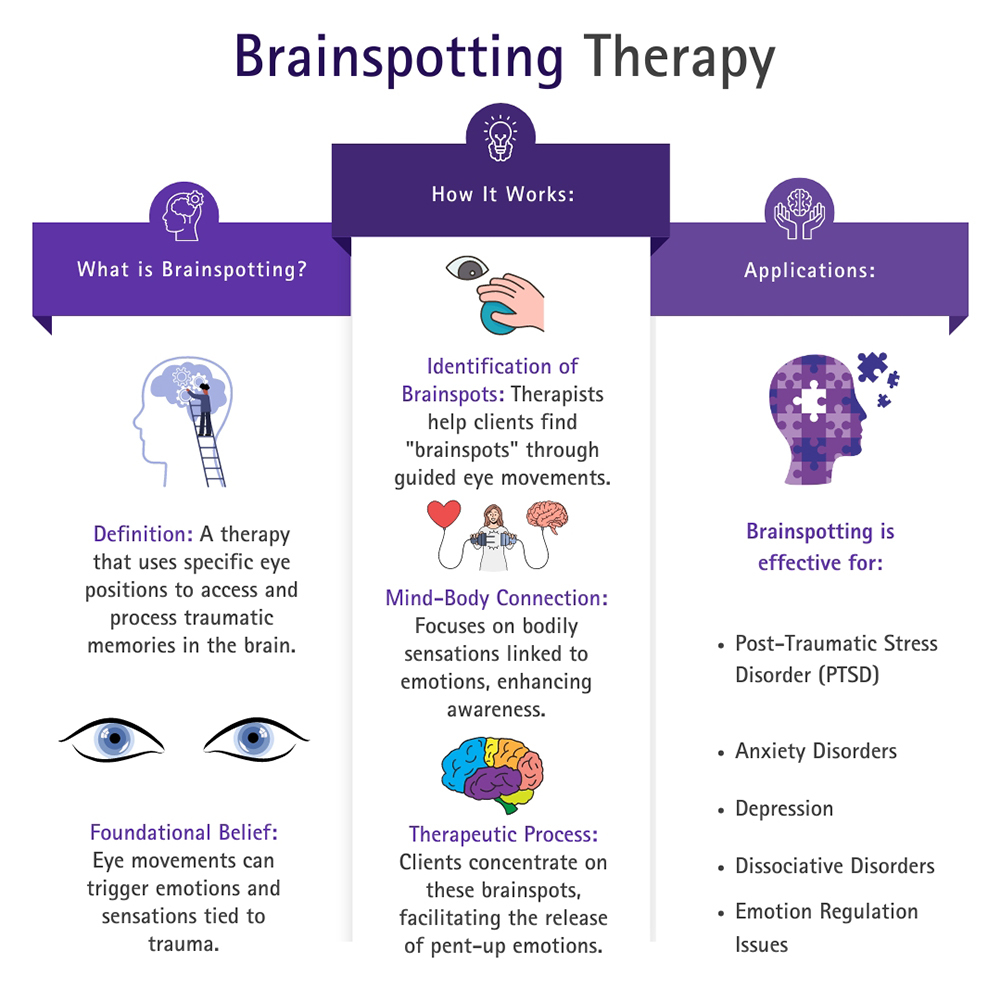What is Brainspotting Therapy?
Brainspotting is a powerful therapy that identifies and processes emotional pain and trauma sources. A brainspot is a visual point in space to which you have a strong reaction. Your therapist will guide your eyes to identify which area in your field of vision produces the strongest emotional and physical response.
Brainspotting is a neurobiological tool that helps you and your therapist identify areas that need work. With this tool, you can release experiences and symptoms that are typically subconscious.
At the Trauma Therapy Center, this is a safe and confidential process. You can trust our therapists to provide you with the latest evidence-based tools and interventions.
Effectiveness

According to a study published in the Clinical Psychology Review, brainspotting was shown to be effective in reducing the symptoms of anxiety disorders in adults. This means that brainspotting was more effective than no treatment or other types of treatment in reducing anxiety symptoms.
Another study in the Journal of Affective Disorders showed that brainspotting was effective in reducing the symptoms of depression in adults. This means that brainspotting was more effective than no treatment or other types of treatment in reducing depression symptoms.
Brainspotting can be an effective therapeutic approach; however, it is important to note that its effectiveness depends on several factors, including:
- Individual variability: Each person has different traumas and different reactions to brainspotting.
- Client’s willingness: Brianspotting requires the client’s active participation in the process to be effective.
- Therapeutic relationship: As with any type of therapy, the trust between therapist and client is of utmost importance.
- Severity of trauma: The severity of your trauma can influence the duration of therapy.
- Medications: Some medications can interact with brainspotting.
Brainspotting has been proved through extensive research to be an effective treatment option. However, each individual experiences this therapy differently and may have varied results.
Brainspotting Online Therapy or Virtual Consultations
Failures
Some factors that can contribute to failure in achieving the desired result from brainspotting include:
- Complex issues: Some situations or conditions may require a combination of brainspotting along with other therapies.
- Unrealistic expectations: Expecting drastic results, whether positive or negative, can often affect the outcomes of therapy.
- Insufficient time: Some conditions may require more sessions than others. Termination of therapy before resolving issues can cause negative outcomes.
It is important to remember that different therapeutic approaches can have different outcomes for varying situations. To achieve your goals with brainspotting make sure you set clear goals, engage actively in therapy, and maintain self-care practices.
Brainspotting for Trauma
Brainspotting trauma therapy helps you find the places in your mind where your traumatic memory is stored by accessing the subconscious and rewriting the narrative.
Brainspotting does not require retelling your story. It focuses on the mind-body connection by examining the physical sensations associated with the trauma to release the stored tension.
Brainspotting therapy can be used for mental health conditions such as:
- Trauma
- Anxiety and panic disorders
- Depression
- Phobias
- Addictions
- Stress management
- Performance enhancement
- Grief and loss
- Relationship issues
- Improvement of overall well-being
Trauma Therapy Center takes a holistic approach to trauma therapy. This means our therapists address the root cause of trauma. Brainspotting is one of the tools our therapists use to provide comprehensive treatment.

The Brainspotting Process
According to a study published in the Clinical Psychology Review, brainspotting participants showed significant reductions in anxiety symptoms after an average of 8-12 sessions.
It is important to remember that everyone has different traumatic experiences, different needs, and different responses to therapy. Talk to your therapist about how many sessions are most appropriate for you.
It is possible to notice results after just one brainspotting session. However, to achieve the maximum effect, it is recommended that multiple sessions be attended.
Our team of experienced brainspotting therapists at the Trauma Therapy Center in West Palm Beach is ready to guide you through this journey of profound self-discovery and healing. Don’t wait any longer; start your path to emotional transformation today by contacting our trusted brainspotting therapists and experience the emotional freedom you deserve.

